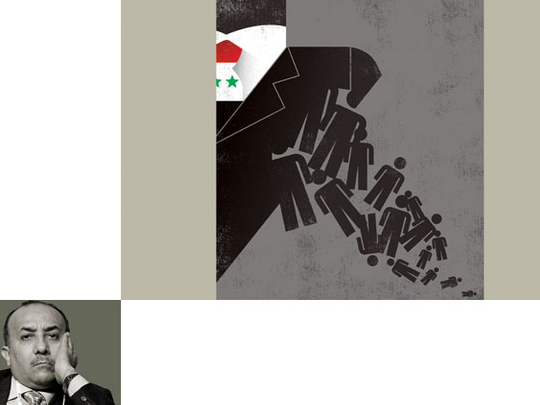
As the world is gripped by the race for most gold medals between team USA and China in the London Olympics, and as Europeans struggle with the financial meltdown and the future of the Eurozone, the battle for Aleppo rages. The future of Syria and the balance of power in the region are at stake.
Kofi Annan, former UN secretary-general, Nobel Prize laureate and special UN-Arab League envoy to Syria, has tendered his resignation in indignation and helplessness. The stalemate, political impasse, finger-pointing and name-calling among the major powers prompted his decision. Meanwhile, Syria keeps bleeding and the Syrians have become the victims of games nations play.
A Cold War is brewing at the international and regional levels over Syria. It was bound to happen, given the brutality of the Syrian regime bent on crushing the 17-month-old popular uprising against the five-decade old minority Alawite regime. The regime has dominated Syrian polity and run it as a Soviet-style dictatorship — a brutal one-party system.
The realpolitik and grim atrocities unfolding on our TV screens and on smartphones have become unbearable — from the tormented people to the devastated cities. Atrocities and massacres have become common, something we did not see in other Arab Spring revolts — Tunisia, Egypt, Yemen and even Libya.
The atrocities, massacres, mayhem and the bloodletting have reached a crescendo. Over 20,000 dead, tens of thousands injured, orphaned and displaced. But no one knows the exact figures of the dead and injured in this longest and bloodiest Arab uprising. What adds to the grim picture is the plight and the suffering of the millions of Syrians who are displaced internally and in neighbouring countries.
There is also the fear of violence spilling over to neighbouring countries, which could spark a regional war with severe consequences. Syria has become the sore thumb of the Arab world. No one seems to have a clue about how to end this bloodbath. Diplomacy has hit a major snag with Annan’s resignation, who had, as he described it from the word go, an “impossible mission” with his six-point plan, where the Syrian regime danced around it and was in no mood to implement any of its points. The tragedy is that both sides of the Syrian conflict are emboldened by their backers. Which may render any peace settlement untenable.
The Arab world has witnessed dramatic events over the last year and a half. It is in turmoil and its once entrenched authoritarian regimes are under great pressure. Some relinquished power; others like Al Assad are still clinging on to it. The trajectory of these events is unclear, which naturally creates a lot of apprehension and uncertainty.
What makes the regional geopolitical scene murkier is the emboldened masses, the retreat of the US from the region and the re-emergence of old powers — Russia and China — that are using the Syrian mayhem as a springboard to rekindle their lost glory. These two have blocked any move by the United Nations to check the butcher of Syria. They have vetoed three Security Council resolutions and voted against a non-binding resolution in the General Assembly condemning the atrocities of the Syrian regime and calling for ending the deployment of heavy artillery weapons and peaceful transfer of power.
Russia, China and Iran were among the 12 countries which rejected the resolution supported by 133 countries. Such a climate is reminiscent of the Cold War era between the US and its allies on one hand and the Soviet Union and its Communist allies on the other. Both superpowers sized up regions, employed various tactics of containment, detente and brinkmanship.
These tactics have paralysed the UN with veto-wielding Americans and Russians frustrating each other.
At the regional level, a restructuring is taking place with the return of the Gulf Cooperation Council-Egypt led alliance to shore up moderate Sunnis against Shiite Iran, which seems to be one of the biggest losers in the Arab Spring. In addition to being hamstrung and bleeding as a result of the crippling sanctions over its nuclear programme, Iran now faces the loss of the jewel in its regional crown — the Syrian regime.
This Cold War is in full swing between the Sunni states and Iran. It manifests itself in the soft influence exerted on the hearts and minds of Arabs through Al Jazeera and Al Arabiya; by arming the Free Syrian Army and initiating resolutions in the UN to isolate the Syrian regime and its regional and international backers.
In an unprecedented move, UN Secretary-General Ban Ki-moon criticised the Security Council for becoming “paralysed” by divisions over Syria. The paralysis, according to Ban, has led to a “proxy war, with regional and international players arming one side [of the Syrian conflict] or the other”. Pitting the GCC states, Turkey and the West on one hand and Russia, China and Iran on the other hand. Both sides accuse each other of “undermining plans for negotiated settlement”.
Something has to give; the region has become the victim of power politics, and a powder keg due to games nations play. The tragic end result is that the Syrian people and the people of the region are the ones who are paying the t toll of the politics of brinkmanship. The region is being transformed before our eyes; and the changes in the socio-political and geo-strategic landscape are mind-boggling.
Professor Abdullah Al Shayji is the Chairman of the Political Science Department, Kuwait University. You can follow him on Twitter at www.twitter.com/docshayji








